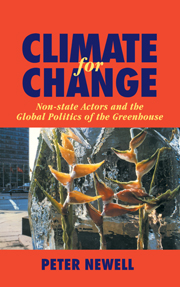Book contents
- Frontmatter
- Contents
- Acknowledgements
- 1 Politics in a warming world: introduction
- 2 Existing approaches: problems and limitations
- 3 Knowledge, frames and the scientific community
- 4 Climate of opinion: the agenda-setting role of the mass media
- 5 Climate for business: the political influence of the fossil fuel lobbies
- 6 Climate for change: environmental NGOs
- 7 Conclusion: states, NGOs and the future of global climate politics
- Appendix A List of abbreviations
- Appendix B Chronology of the international response to the issue of climate change
- References
- Index
2 - Existing approaches: problems and limitations
Published online by Cambridge University Press: 02 December 2009
- Frontmatter
- Contents
- Acknowledgements
- 1 Politics in a warming world: introduction
- 2 Existing approaches: problems and limitations
- 3 Knowledge, frames and the scientific community
- 4 Climate of opinion: the agenda-setting role of the mass media
- 5 Climate for business: the political influence of the fossil fuel lobbies
- 6 Climate for change: environmental NGOs
- 7 Conclusion: states, NGOs and the future of global climate politics
- Appendix A List of abbreviations
- Appendix B Chronology of the international response to the issue of climate change
- References
- Index
Summary
This chapter reviews two sets of interrelated literature that are relevant to this book; the rapidly expanding literature on global environmental politics; and, more specifically, the literature on the politics of global warming. Finally it looks at how the concept of power is addressed in these bodies of literature, and outlines alternative notions of the concept that may be useful to a project on non-state actors.
Existing approaches to explaining global environmental politics
Most analysis of global environmental politics emanating from the discipline of international relations remains firmly rooted in a state-centric paradigm (Paterson 1996a; Saurin 1996; Willetts 1993). In other words, it takes as given the preeminent status of the nation-state as the key point of reference in seeking to account for the way in which issues unfold on the global agenda. The principal theoretical tools are derived from various versions of liberal institutionalism in international relations (Paterson 1996a; Saurin 1996; Smith 1993). The use of existing paradigms is particularly ironic given the repeated emphasis by writers from this discipline upon the way in which environmental issues transform our understanding of world politics (Rowlands 1992; Saurin 1996). For most scholars of international relations, global warming is one of a series of collective action problems following in the trail of issues such as ozone depletion. Ward's (1996:850) depiction of the issue highlights this: ‘Global climate change is characterised as a collective-action game played by nations through time. The conditions under which conditional cooperation can occur are explored.’ Given such a construction of the environmental problematic – as one of inter-state cooperation and institution building – its capture by liberal institutional perspectives was almost inevitable.
- Type
- Chapter
- Information
- Climate for ChangeNon-State Actors and the Global Politics of the Greenhouse, pp. 23 - 39Publisher: Cambridge University PressPrint publication year: 2000



